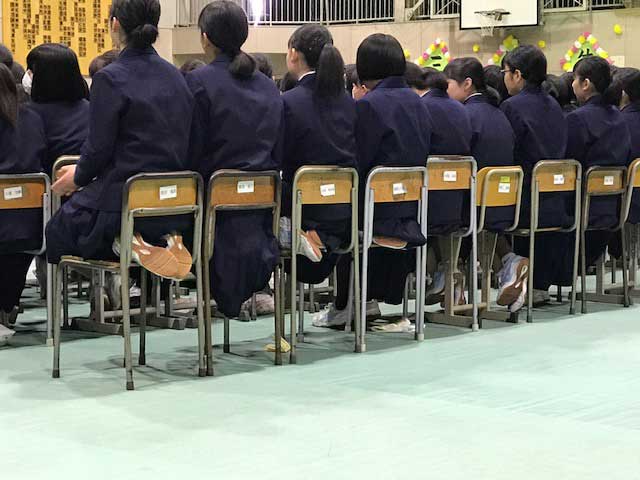By
Lesile Ann Laylor
This is the first of a two-part account of a young Jamaican woman’s two year journey into an alien culture

If you were raised in Jamaica, you’re likely no stranger to the ideology of seeking better opportunities and a better quality of life abroad. This was the driving force behind my own decision to leave the shores of my warm island home for the lure of Japan, the Land of the Rising Sun.
Growing up in the inner-city community of August Town, there always seemed to be only one path to success—getting out. When I got to high school, I was exposed to a different sort of people and experiences. My definition of success began to morph throughout my time at Andrew High School for Girls. My friends were migrating. My classmates were migrating. I was convinced everyone but me was migrating! Very quickly, it became the only thing I wanted to do. I applied to universities abroad and was accepted by them all but was hit by the all too familiar roadblock; my parents couldn’t afford it.
It was the story of my life.
During my time at The University of the West Indies (UWI), I found out about several programmes that allowed you to move abroad. My drive to get off the island was so great that despite the opportunities being on the opposite side of the world from the countries I pined after, I was still willing to jump at them. I didn’t care which country I ended up in, seeking the ones with the lowest barrier to entry. I narrowed my search down to two countries, Japan and China that were looking to recruit teachers of English, a subject I majored in at The UWI. The choice was made for me when I found out that China required you to first obtain a certificate in Teaching English as a Foreign Language (TEFL). I didn’t have one and didn’t have the money to obtain one—a very easy choice, indeed.
My path was clear. I applied for the Summer Work and Travel programme offered at UWI with the clear intention to use every dollar I earned to fund my move to Japan. With funds secured, I took interview after interview, sometimes staying awake at all hours because of the time difference. I did get accepted by a company but things unfortunately fell through after my documents were processed. There I was, visa acquired and ticket booked, but suddenly no promise of a job or home when I arrived. The obsessive nature my determination had taken on did not allow me to take a step back and rethink my plan. I pushed on, deciding I would see what happened when I landed. This was further encouraged by those who’d gone before me. The consensus was that English teaching jobs were a dime a dozen, you just had to be there. I believed that.
Thankfully, I didn’t need to find out how true the statement was. On the weekend before my flight, I received another job offer, this company offering to arrange an apartment for me beforehand and a ride from the airport. I would arrive on Monday, April 1, 2018 and begin work on the Tuesday; the very definition of cutting it close.

On reflection, I can’t understand why none of those stumbling blocks were enough to shake my resolve or at least enough to make me stop and think. In fact, it wasn’t until I was sitting in the main seating area of the Los Angeles International Airport (LAX) that my mind finally slowed down enough to ask just WHAT I thought I was doing. I was overcome by a sudden panic. My family and everything I knew was back in Jamaica. I was sitting in an airport waiting for a one way flight to a country whose language I did not speak and where I knew no one and nothing. This was the first time I realized I’d hit the point of no return and the blind courage that propelled me forward in the previous year had booked its own flight back to Jamaica without me.
To be perfectly honest, I wanted my mother!
The haze of “oh my god, I can’t believe I’m doing this!!” persisted for the first three months after I landed. Without any time to adjust, I had work, shopping for apartment supplies, grocery shopping (its own adventure when you can’t read any of the labels!) and the general adjustment to the obvious; no one looked like me. To say I was nervous would be an understatement. Before moving to Japan, I watched every video I could find on being black in Japan. The experiences were mixed, leaving me uncertain what to brace for. Ever the realist (read: pessimist, haha), I braced for the worst.
I went to my first day of school expecting not to be accepted. I dreaded it. I stayed awake the night before, worrying myself sick over the reactions of my new work colleagues and my new students. My anxiety was compounded by the fact that when I’d done my initial shopping, I was all too aware of the stares I was receiving. I couldn’t walk too far without catching another pair of eyes. The children and the elderly, bless them, were the most overt. It was like stepping onto a stage that you couldn’t get off of.


My situation wasn’t helped by the fact that my company had been using a substitute while they waited to find someone for the job. My school had spent a month with a white male from New Zealand and were none too pleased to find out he was suddenly gone. I could feel the tension in the room while my company representative explained the situation to my principal and head English teacher. I couldn’t understand a word of the meeting, but I could understand the feelings going around the room.
No one was happy about the sudden change.
This made school difficult at first. My head English teacher doubted my English ability. I was meant to aid with lessons but he preferred I stand in a corner and only speak when he needed the students to repeat English words. If I saw problems with the material, he’d tell me about the textbook and dismiss me promptly. I had never felt so small and underappreciated in my entire life. I later found out he would often text the former Assistant Language Teacher (ALT) when he had questions or needed things done instead of asking me—we sat opposite each other at the table in the teacher’s room, to put this into perspective.

However, I must willingly and readily admit, it wasn’t as bad as I thought. From the very first day, the students were excited! They would stop by the teacher’s room to tell me “hello” a million times with wide grins and pure enthusiasm. They wanted to speak to me, no matter their level of English. They wanted to touch my hair (I had put in braids) and had many questions about how I did it. At my elementary school, my 1st graders asked how many braids I had! It was a pleasant surprise. I taught at both an elementary and a junior high. With no prior teaching experience, I was constantly anxious but the children melted me right to my core. I had 1st graders running to give me big hugs, 3rd graders screaming goodbye to me as I rode my bike off school grounds. A few times, my students even ran alongside my bike until they could no longer keep up. I am not naïve enough to think they did not see the differences between us, but I do believe they didn’t care. I was just their “eigo no sensei” (English teacher) and this played a big part in my being able to adjust.

It was the people I met and the interactions I had that made my experience in Japan. I found the Japanese willing and eager to share their culture. They were excited to tell me about their festivals and their beliefs. My students especially enjoyed seeing me try new foods at lunch. They would form groups at their table to figure out how to formulate the questions they wanted to ask and there were more than a few times I found myself essentially playing a game of charades as we mixed English, Japanese and gestures (oh the gestures!) to communicate.
The anxiety before each lesson didn’t go away, nor did the feeling of constantly being watched but I started to see that I could really enjoy Japan, and I did.
Read Part Two of Leslie’s story here


